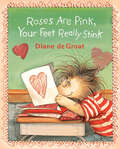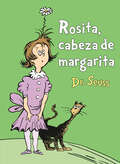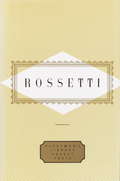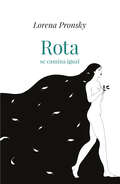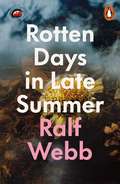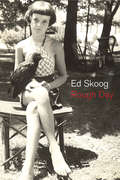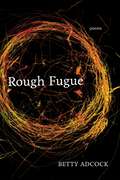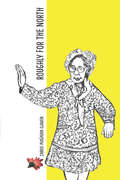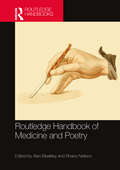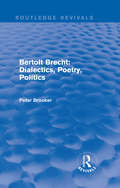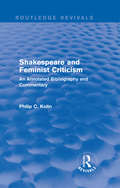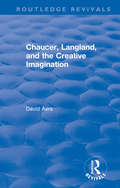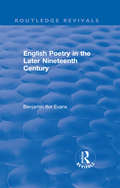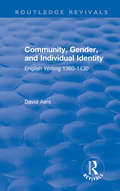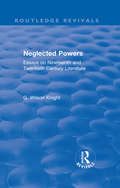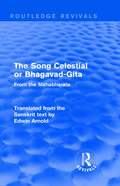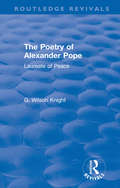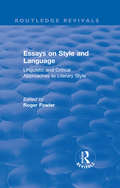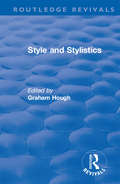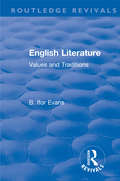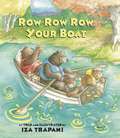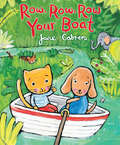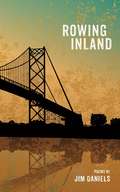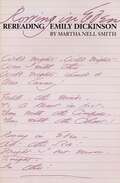- Table View
- List View
Roses Are Pink, Your Feet Really Stink
by Diane deGroatThis Valentine's Day favorite read-aloud will prompt lots of giggles, as well as discussions on kindness and forgiveness.Gilbert is all set to write fifteen friendly valentine cards to his classmates. But how can he write a nice poem for the boy who tweaked his nose, or the girl who made fun of his glasses? Instead, Gilbert writes two not-so-nice valentines...and signs the wrong name on both!When his classmates read his poems, their feelings are hurt, and Gilbert's prank quickly turns into pandemonium. But with the help of a friend and an honest apology, there's always time for a change of heart on Valentine's Day.
Rosita Cabeza de Margarita (Classic Seuss)
by Dr. Seuss¡Edición en rima del fascinante álbum ilustrado de Dr. Seuss acerca de la individualidad y la autoaceptación! De la misma alocada manera en que el Gato causa estragos en El Gato Ensombrerado, una florecita que brota en la cabeza de una niña desata una serie de disparatadas reacciones en este clásico de Dr. Seuss. Ideal para celebrar esas cualidades que nos hacen únicos, ¡este libro de tapa dura es un excelente regalo!Las ediciones rimadas y en español de los clásicos de Dr. Seuss publicadas por Random House brindan la maravillosa oportunidad de disfrutar de sus historias a más de treinta y ocho millones de personas hispanohablantes en Estados Unidos. Los lectores podrán divertirse con las ediciones en español de The Cat in the Hat (El Gato Ensombrerado); Green Eggs and Ham (Huevos verdes con jamón); One Fish Two Fish Red Fish Blue Fish (Un pez, dos peces, pez rojo, pez azul); The Lorax (El Lórax); Oh, the Places You'll Go! (¡Oh, cuán lejos llegarás!); How the Grinch Stole Christmas! (¡Cómo el Grinch robó la Navidad!), y Horton Hears a Who! (¡Horton escucha a Quién!). Ideal tanto para leer en casa como en la escuela, estos libros han sido meticulosamente traducidos, respetando la rima, por autores y traductores latinoamericanos, y supervisados por Teresa Mlawer, reconocida y galardonada traductora durante más de cincuenta años. A rhymed Spanish edition of Dr. Seuss's charming picture book about individuality and self-acceptance!In the same zany way that the Cat wreaks havoc in The Cat in the Hat, a small flower that sprouts from the top of a young girl's head sets off a series of madcap reactions in this classic picture book by Dr. Seuss. An ideal choice for celebrating those qualities that make each of us unique, this unjacketed hardcover makes a great gift!Random House's rhymed Spanish-language editions of classic Dr. Seuss books make the joyful experience of reading Dr. Seuss books available for the more than 38 million people in the United States who speak Spanish. Readers can enjoy over 30 different classic Dr. Seuss titles including The Cat in the Hat (El Gato Ensombrerado); Green Eggs and Ham (Huevos verdes con jamón); One Fish Two Fish Red Fish Blue Fish (Un pez dos peces pez rojo pez azul); The Lorax (El Lórax); Oh, the Places You'll Go! (¡Oh, cuán lejos llegarás!); How the Grinch Stole Christmas! (¡Cómo el Grinch robó la Navidad!); and Horton Hears a Who! (¡Horton escucha a Quién!). Perfect for home and classroom use, they are meticulously translated in rhyme by native Latin American Spanish speakers overseen by award-winning translator Teresa Mlawer.
Rossetti: Poems
by Christina RossettiThese Everyman's Library Pocket Poets hardcover editions are popular for their compact size and reasonable price which do not compromise content. Poems: Rossetti contains a full selection of Rossetti's work, including her lyric poems, dramatic and narrative poems, rhymes and riddles, sonnet sequences, prayers and meditations, and an index of first lines.
Rota se camina igual
by Lorena PronskyLorena Pronsky impuso un nuevo lenguaje en este libro, que lo convirtió clásico entre sus lectores. Rota se camina igual tiene un discurso fiel y contundente que nombra de forma precisa y lacerante las vivencias que todos, en algún momento de nuestra vida, atravesamos. Rota se camina igual es un libro no solo fue un éxito de ventas sino que también se instaló rápidamente como un clásico. Difícil de catalogar dentro de un género literario, Lorena Pronsky logra conmover al lector a través de un lenguaje disruptivo pero sencillo, a través de relatos que nos invitan a conectarnos con nuestras emociones. Apoyada en la herida como parte inevitable de la vida, nos muestra de qué manera podemos darles un nuevo destino a esos dolores que se nos imponen. En este viaje de reencuentro con nosotros mismos nos iremos identificando con las heridas de la pérdida, del abandono, del desamor, y así entender que siempre tendremos dos caminos para elegir: aferrarnos a ese dolor que nos deja en pausa, o bien comprender que asumir la realidad es el primer escalón para reinventarnos e iniciar una nueva etapa. Aceptar que estamos atravesados por tormentas que han dejado una marca indeleble nos enseña que "continuar" es una palabra que encierra todas las posibilidades aún desconocidas. Solo tenemos que tomar ese envión interior para darnos cuenta de que, a pesar de nuestras fisuras personales, rota se camina igual.
Rotten Days in Late Summer
by Ralf WebbA TELEGRAPH AND IRISH TIMES BOOK OF THE YEARLONGLISTED FOR THE POLARI FIRST BOOK PRIZE SHORTLISTED FOR THE FORWARD PRIZE FOR BEST FIRST COLLECTIONSHORTLISTED FOR THE JOHN POLLARD FOUNDATION INTERNATIONAL POETRY PRIZE 'Impressive . . . tender, unflinching' Guardian'This is poetry in the grand tradition of annihiliation by desire. It's what the young are always learning, and the old, if they are wise, never forget' Anne Boyer, author of The Undying'Brilliant . . . heralds the arrival of a frank and vital poetic voice' Sharlene Teo, author of Ponti'Frank and alert . . . an important voice in British poetry' Eley Williams, author of The Liar's Dictionary'Direct and heart-breaking' Alex Dimitrov, author of Love and Other Poems'A rare thing . . . razor-sharp' Julia Copus, author of This Rare Spirit: A Life of Charlotte MewIn Rotten Days in Late Summer, Ralf Webb turns poetry to an examination of the textures of class, youth, adulthood and death in the working communities of the West Country, from mobile home parks, boyish factory workers and saleswomen kept on the road for days at a time, to the yearnings of young love and the complexities of masculinity.Alongside individual poems, three sequences predominate: a series of 'Love Stories', charting a course through the dreams, lies and salt-baked limbs of multiple relationships; 'Diagnostics', which tells the story of the death from cancer of the poet's father; and 'Treetops', a virtuosic long poem weaving together grief and mental health struggles in an attempt to come to terms with the overwhelming data of a life.The world of these poems is close, dangerous, lustrous and difficult: a world in which whole existences are lived in the spin of almost-inescapable fates. In searching for the light within it, this prodigious debut collection announces the arrival of a major new voice in British poetry.
Rouge Memoire: Poesie
by Huguette BertrandENTRE NOUS<P> C'est entre vous et moi que ça se passe<P> entre nos apparences<P> qui ont l'air de dire que nous ne sommes pas là<P> corps défaits par l'haleine chaude de la nuit<P> et les jeux bêtes<P> dormeurs éveillés par un baiser de cheval<P> le hasard prend forme<P> Les jeunes lampes<P> sont des fontaines domptéees<P> par les yeux qui passent
Rough Day
by Ed SkoogComposed during long walks throughout Washington, DC, and careful to err on the side of recklessness, Rough Day finds its essential unity in a fixation on American events and landscapes-from Yellowstone and New Orleans to Kansas and the Pacific Northwest. Throughout, Ed Skoog maintains an openness to discovery that unveils rare and prismatic views into his country.A native of Topeka, Kansas, Ed Skoog's first book of poetry, Mister Skylight (Copper Canyon Press), was published in 2009. His poetry has appeared in Poetry, American Poetry Review, and The Paris Review. He teaches at the University of Montana and lives in Missoula, Montana
Rough Fugue: Poems (Southern Messenger Poets)
by Betty AdcockBetty Adcock brings fierce insight to her seventh poetry collection, Rough Fugue. Her elegant stanzas evoke bygone moments of beauty, reflection, and rage. “Let things be spare,” she writes, “and words for things be thin / as the slice of moon / the loon’s cry snips.” Adcock’s poems are often spare but never thin, shifting effortlessly from the eerie red of brake lights on a Texas highway to the fluorescents of an office building where a tired worker imagines a holiday in Spain.Adcock reflects upon her poetic forebears, chronicling the desire to write that led them to create cuneiform tablets, scrolls of papyrus, and ultimately vellum and parchment. She also recounts memories about the life with her late husband and tries to define herself in the bewildering new role of “widow.” In poems ranging in tone from playful to reverential, Rough Fugue showcases the work of a veteran poet at her masterful best.
Roughly For the North (The Alaska Literary Series)
by Carrie Ayagaduk Ojanen“I wish I were a dancer to let lines fall like that. / But I am dressed like you, roughly for the North.” Roughly for the North is a tender and complex portrait of an Arctic and sub-arctic world. Full of lush language and imagery, each poem is an act of devotion and love to one’s family and land. Carrie Ayaġaduk Ojanen weaves a moving portrait of grief, of the rippling effects of historical trauma on succeeding generations, of resilience in the face of adversity, of respect for the Alaska Native traditions she grew up in. With vivid imagery, she draws the reader into Northern life, where the spiritual and industrial collide. She uses formalism and lyrical free verse to explore the natural world and to conjure a place of staggering beauty that hides death around every corner. A member of the Ugiuvamiut tribe, Ojanen grounds her work in a web of familial relationships. Especially important is her connection with her grandparents, members of the last generation to make their home on Ugiuvak (King Island), Alaska. With heartfelt verse, her poems reflect the staggering cultural changes her grandparents faced and the way traditional art forms continue to unite her community and help them connect to the past.
Routledge Handbook of Medicine and Poetry
by Shane Neilson Alan BleakleyThe Routledge Handbook of Medicine and Poetry draws on an international selection of authors to ask what the cultures of poetry and medicine may gain from reciprocal critical engagement. The volume celebrates interdisciplinary inquiry, critique, and creative expansion with an emphasis upon amplifying provocative and marginalized voices.This carefully curated collection offers both historical context and future thinking from clinicians, poets, artists, humanities scholars, social scientists, and bio-scientists who collectively inquire into the nature of relationships between medicine and poetry. Importantly, these can be both productive and unproductive. How, for example, do poet-doctors reconcile the outwardly antithetical approaches of bio-scientific medicine and poetry in their daily work, where typically the former draws on technical language and associated thinking and the latter on metaphors? How does non-narrative lyrical poetry engage with narrative-based medicine? How do poets writing about medicine identify as patients? Central to the volume is the critical investigation of the consequences of varieties of medical pedagogy for clinical practice.Presenting a vision of how poetic thinking might form a medical ontology this thought-provoking book affords an essential resource for scholars and practitioners from across medicine, health and social care, medical education, the medical and health humanities, and literary studies.
Routledge Revivals (1988): Dialectics, Poetry, Politics
by Peter BrookerFirst published in 1988, this books argues with received accounts to reclaim Brecht’s emphasis on his self-described ‘dialectical theatre’, re-examining firstly the concepts of Gestus and Verfremdung and their realisation in Brecht’s poetry in terms of his attempt to consciously apply the methods of dialectical materialism to art and cultural practice. The author also takes issue with the customary view of Brecht’s career and politics which sees him as compromising either with Communist party dogma or bourgeois aesthetics, to find developing parallels between Brecht’s political and artistic though and the critical dialectics of Marx, Lenin and Mao. This development is examined in later chapters in relation to the early and late plays, The Measures Taken and Days of the Commune as well as in relation to Brecht’s changed circumstances in the years of war-time exile and in post-war East Germany.
Routledge Revivals: An Annotated Bibliography and Commentary (Routledge Revivals)
by Philip C KolinFirst published in 1991, this book is the first annotated bibliography of feminist Shakespeare criticism from 1975 to 1988 — a period that saw a remarkable amount of ground-breaking work. While the primary focus is on feminist studies of Shakespeare, it also includes wide-ranging works on language, desire, role-playing, theatre conventions, marriage, and Elizabethan and Jacobean culture — shedding light on Shakespeare’s views on and representation of women, sex and gender. Accompanying the 439 entries are extensive, informative annotations that strive to maintain the original author’s perspective, supplying a careful and thorough account of the main points of an article.
Routledge Revivals: Chaucer, Langland, and the Creative Imagination (Routledge Revivals)
by David AersFirst published in 1980, this study of two renowned later fourteenth century English poets, Chaucer and Langland, concentrates on some major and representative aspects of their work. Aers shows that, in contrast to the mass conventional writing of the period, which was happy to accept and propagate traditional ideologies, Chaucer and Langland were preoccupied with actual conflicts, strains, and developments in received ideologies and social practices. He demonstrates that they were genuinely exploratory, and created work which actively questioned dominant ideologies, even those which they themselves revered and hoped to affirm. For Chaucer and Langland the imagination was indeed creative, involved in the active construction of meanings, and in their poetry they grasped and explored social commitments, religious developments and many perplexing contradictions which were subverting inherited paradigms.
Routledge Revivals: English Poetry in the Later Nineteenth Century (Routledge Revivals)
by B. Ifor EvansFirst published in 1933, this study, which underwent revision in the 1960s, is a comprehensive survey of the verse of English nineteenth-century poets whose work appeared after 1860. A special feature is the full and critical treatment of minor writers. In no other book is their work so carefully evaluated. There is a full account of the minor Pre-Raphaelites, of James Thomson, the poet of The City of Dreadful Night, of Henley, Stevenson and George MacDonald. John Davidson is the subject of a long and revealing study. Evans suggests that poetry from the late nineteenth century is neglected in scholarly study, and that Victorian Romanticism deserves more attention than it has recently received.
Routledge Revivals: English Writing 1360-1430 (Routledge Revivals)
by David AersFirst published in 1988, David Aers explores the treatment of community, gender, and individual identity in English writing between 1360 and 1430, focusing on Margery Kempe, Langland, Chaucer, and the poet of Sir Gawain. He shows how these texts deal with questions about gender, the making of individual identity, and competing versions of community in ways which still speak powerfully in contemporary analysis of gender formation, sexuality, and love. Making wide use of recent research on the English economy and communities, and informed by current debates in the theory of culture and gender, the book will be of interest to those concerned with Medieval studies, Renaissance studies, and Women’s studies.
Routledge Revivals: Essays on Nineteenth and Twentieth Century Literature (Routledge Revivals)
by G. Wilson KnightFirst published in 1971, Professor Knight’s book draws analytic attention to poets including Tennyson, Masefield, and Brooke, who are shown to hold a dimension of meaning previously ignored or misunderstood. Homage is paid to John Cowper Powys as one of the foremost seers of the modern age. A comprehensive review of the work of Francis Berry claims to establish him as our foremost living poet. Professor Knight urges, and goes far to prove, that modern literary criticism up until the 1970s failed to touch upon the richer meanings of contemporary literature – he stresses the relation between such acclaimed poets as Yeats and Eliot and the spiritualistic movements of contemporary times. Knight regards youth-revolts as a sign of a healthy dissatisfaction with an irreligious and directionless culture, and believes that hope lies in the neglected powers pressing for acceptance.
Routledge Revivals: From the Mahabharata (Routledge Revivals)
by Edwin ArnoldFirst published in 1909, this book presents an English translation of chapters 25-42 of the Bhishma Parva from the epic Sanskrit poem Mahabharata — better known as the Bhagavad-Gita, reckoned as one of the "Five Jewels" of Devanagari literature. The plot consists of a dialogue between Prince Arjuna and Krishna, the Supreme Deity, in a war-chariot prior to a great battle. The conversation that takes place unfolds a philosophical system which remains the prevailing Brahmanic belief, blending the doctrines of Kapila, Patanjali, and the Vedas. Building on a number of preceding translations, this highly-regarded poetic interpretation provides a major work of literature in an accessible popular form.
Routledge Revivals: Laureate of Peace (Routledge Revivals)
by G. Wilson KnightFirst published in 1955, this exegesis on the writings of Alexander Pope reveals the technical felicities of his poetry, and is the first to be devoted to the great meaning inherent in his work. One section, which has appeared before and did much to redirect the study of Pope, has been thoroughly revised. Of the other four chapters, one offers an original of The Temple of Fame, and, while discussing this neglected poem, makes several suggestions which may be said to constitute a significant advance in aesthetics. Another analyses Byron’s support of Pope, regarding it as a landmark in the history of English literary criticism and as necessary to the understanding of Pope and Byron alike. The last chapter discusses the relation of Pope’s thought to our own time. This book adds much to what is already known of Pope, and will go far in reviving an interest in the work and philosophy of the Laureate of Peace.
Routledge Revivals: Linguistic and Critical Approaches to Literary Style (Routledge Revivals)
by Roger FowlerFirst published in 1966, this book is contributed to by authors who share an interest in the literary uses of language. The book gives a close analysis of the language of literature contributed to by critics and linguists, examining linguistic theory and poetry, and as part of this the rhythm and metre of English poetry is deconstructed. Language and its emotive structure is analysed, while the middle chapters of the book address the interaction of linguistic dimensions. Two medievalist scholars conclude the volume, giving a well-rounded examination to the broad and complex study of literary style in the English language. This book is suitable for students and scholars concerned with English literature and linguistics.
Routledge Revivals: Style and Stylistics (Routledge Revivals)
by Graham HoughFirst published in 1969, Professor Hough’s work examines stylistics – the bridge between linguistics and literary criticism. The book gives a short survey of stylistics from a literary point of view, and tries to answer the question of how much stylistics contributes to the understanding of literature. It brings together continental European work on stylistics and Anglo-American critical writing which has a similar purpose though usually under a different name. In calling the attention of the student of literature to trains of thought with which he is not generally familiar, and with detailed analysis on different literary styles and methods, Professor Hough provides important critical insights.
Routledge Revivals: Values and Traditions (Routledge Revivals)
by B. Ifor EvansFirst published in 1962, this book is a reflection on Sir Ifor Evans’s well-known A Short History of English Literature. In this reflective study, Evans wonders if it is possible to trace permanent elements in such a huge and varied mass of writings? As he moves from the Anglo-Saxon Caedmon to T.S Eliot, or from Milton to James Joyce, he finds out how, in unexpected ways, the English spirit of compromise extends into its literature, along with its love of nature and interest in the individual. In poetic imagery above all the British genius seems, typically, to have found a way of making ‘empiricism transcendental’. This book, which had its origin during the war under the aegis of the British Council, provides the reader with a stimulating passport to a very rich kingdom.
Row Row Row Your Boat (Iza Trapani's Extended Nursery Rhymes)
by Iza TrapaniClimb aboard, read, and sing along with this adorable family of bumbling bears as they row, row, row their boat on a merry adventure in this beloved, reimagined nursery rhyme. Hold on to your hats and get ready to laugh as these irresistible characters rock, bash, and splash their way into your heart. Iza Trapani brings a fresh spin to this classic song with new verses and sweet and vibrant illustrations. Young readers will recognize the song and delight in seeing it come to life as the bears paddle their way through the pages.
Row, Row, Row Your Boat (Jane Cabrera's Story Time)
by Jane CabreraRead, row, and roar along - a newly imagined favorite will have everyone singing.In this vibrantly-painted rain forest, squeak, bark, and chatter along with a kitten and puppy rowing their way down the stream. Uncover one delightful animal surprise after another. Sheet music with guitar chords, along with Cabrera's jaunty new verses, is included.Jane Cabrera's Story Time celebrates children's best-loved read along nursery rhymes and songs. These interactive favorites are given a new twist by award-winning artist Jane Cabrera and feature her bold, bright, kid-friendly illustrations. Don't miss the other delightful nursery-rhyme titles, including Here We Go Round the Mulberry Bush, If You're Happy and You Know It, and One, Two, Buckle My Shoe.
Rowing Inland (Made in Michigan Writers Series)
by Jim DanielsRowing Inland, Jim Daniels’s fifteenth book of poetry is a time machine that takes the reader back to the Metro Detroit of his youth and then accelerates toward the future. With humor and empathy, the author looks at his own family’s challenges and those of the surrounding community where the legacy handed down from generation to generation is one of survival. The economic hits that this community has to endure create both an uncertainty about its future and a determined tenacity. Divided into four sections, Rowing Inland calls out key moments from the author’s life. The events that inspire many of these poems took place a long time ago and often it has taken the poet his entire life to write about those experiences and write about them with the necessary emotional distance. For example, some of the poems in the section “Late Invocation for Magic” reference the first girl he ever kissed and her accidental death by fire. In the last section of the book, Daniels approaches the current political and social standings in Detroit with lines like, “The distance to Baghdad or Kandahar / is measured in rowboat coffins / while here in the fatty palm of The Mitten / minor skirmishes electrify tedium.” Although it focuses on Detroit’s metropolitan area, the book can be considered a snapshot of working-class life anywhere across the country. Daniels casts his lens on a way of life that is often distorted or ignored by the powers that be. He zooms in on street level where all the houses may look alike but each holds its own secrets and dreams. To paraphrase novelist and screenwriter Richard Price, Detroit is the “zip code for [Daniels’s] heart”—a place that his writing will always come back to. Readers of contemporary poetry with a regional persuasion will enjoy this collection.
Rowing in Eden: Rereading Emily Dickinson
by Martha Nell SmithEmily Dickinson wrote a "letter to the world" and left it lying in her drawer more than a century ago. This widely admired epistle was her poems, which were never conventionally published in book form during her lifetime. Since the posthumous discovery of her work, general readers and literary scholars alike have puzzled over this paradox of wanting to communicate widely and yet apparently refusing to publish. In this pathbreaking study, Martha Nell Smith unravels the paradox by boldly recasting two of the oldest and still most frequently asked questions about Emily Dickinson: Why didn't she publish more poems while she was alive? and Who was her most important contemporary audience? Regarding the question of publication, Smith urges a reconception of the act of publication itself. She argues that Dickinson did publish her work in letters and in forty manuscript books that circulated among a cultured network of correspondents, most important of whom was her sister-in-law, Susan Huntington Gilbert Dickinson. Rather than considering this material unpublished because unprinted, Smith views its alternative publication as a conscious strategy on the poet's part, a daring poetic experiment that also included Dickinson's unusual punctuation, line breaks, stanza divisions, calligraphic orthography, and bookmaking - all the characteristics that later editors tried to standardize or eliminate in preparing the poems for printing. Dickinson's relationship with her most important reader, Sue Dickinson, has also been lost or distorted by multiple levels of censorship, Smith finds. Emphasizing the poet-sustaining aspects of the passionate bonds between the two women, Smith shows that theirrelationship was both textual and sexual. Based on study of the actual holograph poems, Smith reveals the extent of Sue Dickinson's collaboration in the production of poems, most notably "Safe in Their Alabaster Chambers". This finding will surely challenge the popular conception of the isolated, withdrawn Emily Dickinson. Well-versed in poststructuralist, feminist, and new textual criticism, Rowing in Eden uncovers the process by which the conventional portrait of Emily Dickinson was drawn and offers readers a chance to go back to original letters and poems and look at the poet and her work through new eyes. It will be of great interest to a wide audience in literary and feminist studies.
